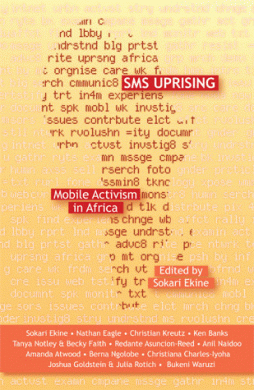SMS Uprising: Mobile Activism in Africa is a new collection of essays and case studies examining how SMS has been used in Africa for acticism. Essays include Amanda Atwood’s report on Kubatana’s experiences in Zimbabwe setting up mobiles as a means of sharing news outside of government propaganda, to Bukeni Waruzi’s essay on collecting data on children’s rights violations in the Democratic Republic of Congo in 2004. SMS Uprising is published by Fahamu, a British-based organization with a focus on information services for Africa.
SMS Uprising provides the reader with a decent understanding of the state of mobile SMS usage in Africa today. The essays are written by writers, developers, activists, and researchers who are committed to Africa, and cover a multitude of ways SMS can be applied for advocacy work – everything from alerts about political unrest to sharing health information. The book is divided into two parts: context and case studies.
Soukari Ekine, the editor, notes:
SMS Uprising is significant for many reasons not least because it has been edited by an African woman activist. Often initiatives in Africa are studied by people who are quite distant from the continent or are academics who are remote from the grassroots of the subject under discussion. The book is also unique in giving an insight into how activists and social change advocates are addressing Africa’s many challenges from within, and how they are using mobile telephone technology to facilitate these changes...The intention is that the information contained within the book will lead to greater reflection about the real potential and limitations of mobile technology.
This two-pronged approach (providing insight into the current state of African ICTs while also providing a roadmap for others interested in incorporating mobile technology into their activism work) has varied levels of success. SMS Uprising does a good job of balancing optimism about the future against the realities of working in Africa, where there are significant technological and social limitations to implementing mobiles in advocacy.
Anil Naidoo, focusing on The Umnyango Project, came to the realization that, for its particular needs, SMS “might at best be used as a complement to social organizing rather than as the central part.” It’s refreshing to read this kind of honesty, as our industry is sometimes so enamored of technology that it’s seen as the solution to all problems.
That’s not to say that there are not case studies that had positive outcomes; many of the other case studies did have results. Amanda Atwood’s essay Kubatana in Zimbabwe: Mobile Phones for Advocacy, shows that mobile phones can provide a way for sharing much-needed information to a populace starved for news. The straightforward approach to the potential (and limitations) of mobile technology in Africa is useful to readers who want an honest take on the current technological landscape in Africa.
Another way in which the book succeeds is in its look at how projects adapted and evolved. For example, Tanya Notley and Becky Faith’s Mobiles In-a-Box: Developing a Toolkit with Grassroots Human Rights Advocates recounts the development of the Tactical Tech's mobiles-in-a-box toolkit. The essay delves into the work and testing needed to develop a mobile support system for activist organizations, which could be useful to social change workers wondering how to go about developing tools and incorporating them into their work.
But while the context and case studies give readers good examples of the landscape and examples, it is doubtful if any of the case studies could be exactly replicated; the book is perhaps better used as a background primer for developing and incorporating mobile technology strategically, rather than a blueprint.
The first section deals with the context of mobiles in Africa, covering economics and power, trends and software development, and scale and adoption of new technology. This is most useful for readers wanting to find general information on the African mobile landscape. The case studies, which focus on particular uses of SMS in the field, are more useful for readers looking for examples of how to incorporate SMS and mobile technology into their advocacy work. However, some of the case studies are rather dated - detrimental for how-to guidance in a field and landscape that is rapidly evolving.
SMS Uprising: Mobile Activism in Africa offers a glimpse at how change is coming to Africa from within Africa. The collection of authors are clearly dedicated to using technology to improving life in African countries. The book gives readers insight into some of the nuts and bolts of creating social change programs; and for readers looking for an honest breakdown of the challenges and work that goes into incorporating mobile technology into activist work, SMS Uprising is a valuable read.
SMS Uprising: Mobile Activism in Africa is published by Fahamu Books and costs £12.95.


Post new comment